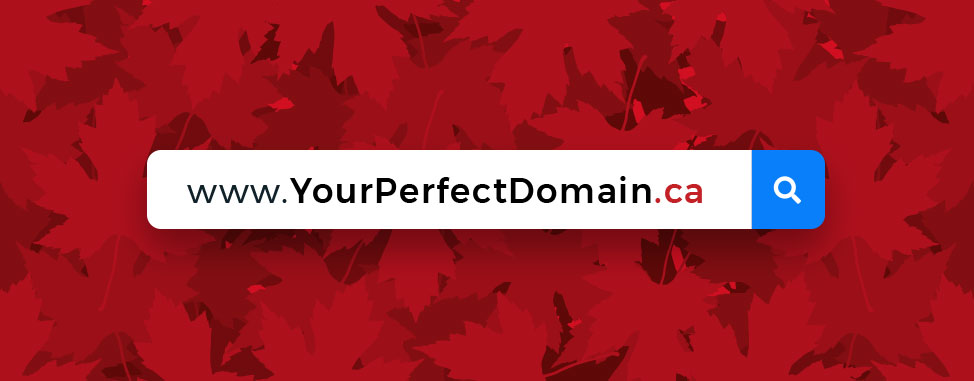
The Canadian Guide to Finding Your Perfect Domain Name
Your domain name is your online identity and a key branding element for any business. If chosen wisely, your domain name will stay with you for years, maybe even a lifetime. Your domain name is also an investment. If your online popularity grows, so will the value of your domain name.
It’s safe to say that picking the right domain name is an important part of any new project. So how can you ensure you make the right choice?
We’ll try to answer this question with tips specifically catered to Canadian businesses and individuals in order to help you find a domain name that will improve your brand, drive traffic and increase your bottom line.
What is a Domain Name, anyhow?
Before jumping into how to pick a great domain, let’s make sure we understand what it is.
Domain names like google.com and whc.ca are online addresses, used to access websites for business, news sources and whatever other treasures (or oddities!) the Internet holds.
On a more technical level, a domain name is a string of characters that can be translated into an electronic address (called an Internet Protocol, or IP, address) by computer systems connected to the Internet, using a service called DNS.
Available domain names can be registered for a yearly fee and for a period ranging between 1 to 10 years through a domain name registration provider such as Web Hosting Canada. Once registered, you can renew your domain indefinitely by paying its renewal fees. If you do not renew your domain, it generally gets released within 3 months of its expiration so that someone else may register it.
Understanding the different components of a domain name
A domain name is made up of different parts. Let’s break it down to get a better picture:
- Domain Name: The unique address that identifies your website, like “example.ca”. It’s comprised of a name and an extension.
- Name: The main part of the domain name, located left of the dot, sometimes referred to as second-level domain or SLD. You can register any name that is available in a specific extension, so you can get creative! It can only include letters, numbers and hyphens, and it is not case-sensitive. It cannot exceed 253 characters (nor would it be practical to have one that long!)
- Extension: The rightmost part of the domain name, such as .CA or .COM. It’s also referred to as a top-level domain or TLD. There are more than 1000 TLDs available today, some of which are restricted by profession or geographical location, but most of which are open and available to all.
- Subdomain: This is not part of your domain name or domain registration process. You can create as many subdomains as you want from your hosting account, so don’t worry about this!
When picking out a new domain name, you’ll be searching for a name and extension combination that hasn’t already been reserved by someone else. While you can get super creative on the name part, your choice of extension is limited by what is available from registries (the companies that manage domain extensions, such as Verisign and CIRA).
For example, I can make my domain name MyDomainIsSuperCool.ca if it is available, but because no registry has created the domain extension .supercool, I can't have the domain name MyDomainIs.SuperCool
Now that we understand the different parts of a domain name, let's get to the business of how to pick out the best name.
11 Tips for Choosing a Great Domain Name (Canadian Edition!)
1. Include your Brand
Try to include your brand’s name in your domain. It will help make your domain memorable, while keeping it simple and clear.
For example, CanadaGoose.com is a more effective domain name for the Canada Goose brand than would be CanadianWinterJackets.com, despite the fact that the second contains keywords.
2. Make it Intuitive and Descriptive
Don’t keep visitors guessing! Make your domain name more memorable by clearly reflecting what your business is all about, and by making it easy to type. You can do this by including useful keywords that people may use when searching for websites such as yours.
Some examples include:
- AffordableHomesInVancouver.ca
- LowCostAutoRepair.com
- ToysForToddlers.ca
Some useful tools can help you discover the most popular keywords:
- Google Trends - Discover what is trending and what related keywords are also trending.
- Ubersuggest - Uncover the amount of searches performed per month for a particular keyword and some related ideas.
While you may be tempted to include multiple keywords, in the past few years Google has considerably decreased the importance it attributes to keywords in domains. Having said that, including keywords in domains still provides an SEO advantage when used as anchor texts in links.
3. Aim for the .CA and .COM first
If you’re doing business in Canada, the .CA extension resonates better with Canadian shoppers, while .COM is the most popular and recognized option worldwide. We strongly recommend you attempt to secure both of these, if available.
The .CA domain extension may actually be a better fit for you if you do most of your business in Canada, since it will immediately identify you as a Canadian business, contrary to a Canadian competitor that may be using a .COM domain.
4. Keep it Short, But Not Too Short
Long names can be hard to remember and provide more chances of being misspelled. Try to choose a domain with less than 20 characters for best results, but avoid using abbreviations or slang that may make your domain shorter but harder to spell.
For example, PopularScience.ca is a superior choice to PopularSci.ca, despite the second domain being shorter.
Keep in mind that the shorter the domain gets, the harder it will be to find it available online. Almost all 3 and 4-letter domain variations are already reserved in the popular extensions, and 5-letter domains are quite scarce too.
5. Consider a Bilingual Domain, or separate domains per language
Do you serve visitors in both French and English? If so, try to find a domain that could be used in both languages (quite tough, in some cases) or consider registering two domains, one in each language.
For example, North America’s oldest company, The Hudson Bay Company, separates its website per language over two domains at thebay.com (English) and labaie.com (French).
Also be aware that in some cases spelling in Canadian English can differ from American or British English. Double check that the words you’ve chosen align with your desired market, and consider registering all variants of your domain’s spelling.
6. Get Creative with Domain Extensions
If your domain isn’t available with .CA or .COM, or if you’re looking to stand out with something different, get creative with any of the hundreds of available new domain extensions. Have a look at our domain extension categories, such as ‘Food and Drink’ or ‘Services’, to discover more options specific to your online project.
Some creative examples include:
- MontrealContemporary.art
- ILoveAll.tech
- SuprisesIn.store
- IWroteA.blog
- ComePlayVideo.games
You’ll notice that the domain availability increase dramatically when you search beyond the “traditional” domain extensions.
7. Make it Easy to Pronounce
In addition to making your domain easy to share verbally in person or over the phone, making it easy to pronounce will also make it more memorable and create a more positive association with your brand. You shouldn’t have to spell your domain in order for people to understand it.
Using numbers, hyphens or slang can lead to misinterpretations when it is heard, and should be avoided if possible. For instance, If someone tells you there are great deals at “get more for less dot ca” would you intuitively think of “get-more4less.ca?”. Probably not.
If you do decide to use numbers, consider registering both the number and the word versions of your domain, for example TopTenLists.ca and Top10Lists.ca
8. Fashion It for Local Search
If you’re targeting a specific area (which you almost always should be!), adding in the city, region or province will help people know right away what area you serve and could increase relevance.
Examples include:
- MississaugaPlumber.ca
- HockeyFans.quebec
- BloorStreetApparel.ca
9. Avoid Trademarks
It’s possible that your domain name could infringe on another businesses’ trademark. Just because you’ve registered the domain name doesn’t mean another business can’t sue you for using it. This could lead to costly legal battles or having to give up your domain name and start the process over again.
As a general rule, don’t include another company’s brand in your domain name, or create any sort of confusion with another company’s brand (including through typos or misspellings). You may also consider checking the Canadian Trademark Database for registered trademarks.
10. Protect Your Brand and your Visitors
Once you’ve chosen your primary domain name, consider protecting it by registering other domains that may be similar. These are called defensive registrations, and they protect you from potential problems, such as competitors — or worse, a hacker — piggybacking off of your success and potentially taking some of your website’s traffic.
Defensive registrations take many forms, but the most common are:
- Popular extensions. If available, consider registering your domain in all available “classic” extensions, which include: .CA, .COM, .NET, .ORG and .CO.
- Misspellings. Not everyone can spell correctly, and even if they do, there are always typos. Check out most commonly misspelled words, and consider registering popular variants.
- Alternatives. Plurals and possessives can be confusing, so if you registered a domain like JoesOrganicFoods.com, consider variants such as JoesOrganicFood.com or JoeOrganicFoods.com
- Bilingual. Even if your website is only in English, you may want to enter the French Canadian market eventually, so registering the french translation of your domain is a smart move.
Keep in mind that with an average price tag of 10-30$ per domain per year, defensive registration costs can add up quickly. The amount you’ll want to spend on it may vary on your tolerance to risk, the revenue your website is generating, and the value of the brand you are using.
11. Use an Effective Domain Spinner
Just because a specific domain name doesn’t have a live website, it doesn’t mean that domain name hasn’t already been registered by someone. The best way to accurately determine if the domain is truly available for registration is with a provider’s domain availability search tool, often also called a domain spinner, because of its ability to provide domain suggestions and alternatives.
A good domain spinner should:
- Provide fast availability results for your searched domain
- Search your domain over multiple possible extensions and provide suggestions
- Allow for quick and easy registrations of one or more domains
- Minimize unnecessary distractions such as service upsells
Web Hosting Canada’s domain search tool provides fast results and searches through 400 of the most popular extensions, helping you find the best domains for your needs.
Act Now Before Someone Else Does!
Domain names are first come, first served. Every day, tens of thousands of new domains get registered worldwide and once they do, they can no longer be registered by you. While it may be possible to purchase a domain from someone else after they’ve registered it (in what is referred to as the domain aftermarket), such purchases can set you back thousands of dollars depending on the domain’s popularity.
The good news is that there are still limitless opportunities to register a great new domain name and with the tips you’ve just read you should be well on your way to choosing an effective domain name that can help build your online brand for many years to come.
Should you need some extra help picking your next domain name, just give us a call! Web Hosting Canada’s domain experts are available to help 24/7.
Happy domaining!

Comments
Leave a Reply Laisser un commentaire
Leave a Reply Laisser un commentaire
Also on the WHC Blog

30,000 Reasons to Say Thank You
In March, Web Hosting Canada surpasses 30,000 active clients continuing an unprecedented growth as Canada’s premier web services provider. We wanted to recognize this moment and to say thank you to all the Canadian businesses,...
Read full article
7 Things to Consider About Website Backups
We all know that website backups are important just like we know that seat belts and safety nets are important: you don’t always need them but when you do, they’re life-savers. Do the following scenarios sound...
Read full article







Well written and substantial content. Thank you.
Thank you Loel!